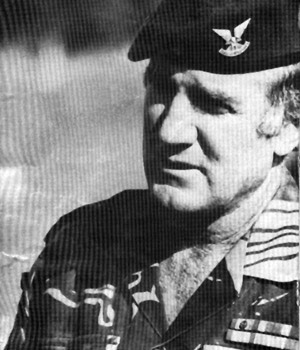“One day you will take a fork in the road, and you’re going to have to make a decision about which direction you want to go. If you go one way, you can be somebody. You will have to make your compromises and … turn your back on your friends, but you will be a member of the club, and you will get promoted and get good assignments. Or you can go the other way, and you can do something, something for your country and for your Air Force and for yourself. … You may not get promoted, and you may not get good assignments, and you certainly will not be a favorite of your superiors, but you won’t have to compromise yourself. … In life there is often a roll call. That’s when you have to make a decision: to be or to do.”
-Col. John Boyd
*****
As I read through this I was thinking ‘What makes a visionary PMC/PSC CEO?’ You really don’t hear much about that kind of thing in our industry. Although there is plenty of good stuff to learn from the military community, and that is why I wanted to post this.
I also had that famous quote running through my head ‘to be, or to do…’ from the mighty Col. John Boyd. One of the points of this article is that the military has a hard time producing leaders that are there ‘to do’ the job, primarily because the system really doesn’t lend itself for that. It is more restrained and not very flexible. Everyone has a specific career track, with boxes that must be checked off. God help you if you draw outside the lines in this world, or dare to take a different path.
The other point made was that of life experiences and preparation for the real world of being in the high command. That these guys are having to not only be masters of the combat arms and strategy, but must also be the ultimate ‘everyman’. They could be working with civilians, talking with Rolling Stone reporters, hanging out with Presidents that could care less about winning wars and more about politics, working with disaster relief organizations in disaster zones, trying to manage a massive civilian contractor force and ‘building snowmobiles’ on a daily basis just to win the numerous political wars, as well as the real wars. Being a general these days is no joke.
I would also apply the same standard to today’s CEO of PMC’s and PSC’s. This is an incredibly fast paced and technological world we live in. In order to stay competitive, a company and it’s leaders must always stay ahead of the game and their competitors. At least in our industry, CEO’s either do well and keep the company profitable, or fail miserably and be kicked to the road. The free market is what produces our ‘visionary commanders’.
Good article and check it out. –Matt
—————————————————————–
What makes a visionary commander, and why the military isn’t producing more of them
By Renny McPherson
September 26, 2010
President Obama recently demoted General David Petraeus, the man who led the turnaround in Iraq and is widely acknowledged to be the most effective military officer of his generation.
In June, the president needed a new commander to lead the war effort in Afghanistan, after General Stanley McChrystal spoke too openly with a Rolling Stone reporter and was forced to resign. And, while few may realize this, when Petraeus was appointed to take over in Afghanistan, he was replacing a subordinate. Petraeus may yet be hailed for saving the day. But he also got a new boss and moved one step down the chain of command.
How does this happen to the best our military has to offer? Why was there no other general to take the job?
The short answer is that the US military has failed to produce enough leaders like Petraeus–the kind of broad-minded, flexible strategic thinkers needed to lead today’s most difficult missions. And a large contributor to this failure is the military’s inflexible system of promotion, which can actively discourage young officers from getting the mind-expanding, challenging experiences that could turn them into potent generals.
